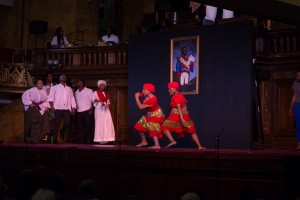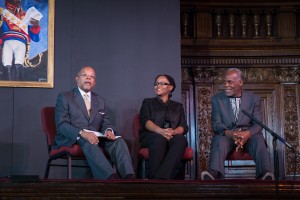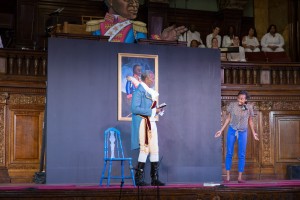Reflections on "Roots of Liberty: The Haitian Revolution and the American Civil War"
29 August 2013 – Marty Blatt
 Hundreds of Boston-area Haitian Americans and African Americans attended the historical pageant, “Roots of Liberty – The Haitian Revolution and the American Civil War,” at Boston’s Tremont Temple on May 4, 2013.
Hundreds of Boston-area Haitian Americans and African Americans attended the historical pageant, “Roots of Liberty – The Haitian Revolution and the American Civil War,” at Boston’s Tremont Temple on May 4, 2013.
Organized by Boston National Historical Park, Boston African American National Historical Site, Central Square Theater, Harvard University, and the Museum of African American History, the performance focused on the significant impact of the Haitian Revolution on black and white abolitionists and black Union troops. Part of the U.S.’s 150th Anniversary of the Emancipation Proclamation, the historical pageant attracted a crowd of 1,700 to the location where the Proclamation was first read in Boston in 1863. The performance featured a diverse cast of actors and actresses, dancers, music, a choir, and an enormous puppet figure of the iconic Haitian leader Toussaint L’Ouverture. Immediately following the play, a Q & A session was moderated by scholar Henry Louis Gates, Jr. featuring the Haitian American writer Edwidge Danticat, who contributed to the script, and the actor Danny Glover, who portrayed Toussaint (shown below, left to right).
 In my years working for the NPS, I have organized several programs and exhibits that address war, either the Revolutionary War or the Civil War. I have often sought to examine stories with a somewhat more unconventional angle. For example, I managed the production of a study on the role of blacks and Native Americans in the Battle of Lexington and Concord and the Battle of Bunker Hill. I played a lead role in celebrating the 100th anniversary of the installation of the Saint-Gaudens monument to Robert Gould Shaw and the 54th Massachusetts Regiment, the first regiment of free Northern black troops. However, “Roots of Liberty” was a qualitative departure from these undertakings in that it openly celebrated a violent revolution that overthrew French colonialism and installed an independent government run by former slaves. Reflecting back, it is perhaps remarkable that a government agency would provide so much support for this undertaking. This was possible because of the demonstrable, clear link between the Haitian Revolution and the freedom fighters of the 1850 and 1860s in the United States.
In my years working for the NPS, I have organized several programs and exhibits that address war, either the Revolutionary War or the Civil War. I have often sought to examine stories with a somewhat more unconventional angle. For example, I managed the production of a study on the role of blacks and Native Americans in the Battle of Lexington and Concord and the Battle of Bunker Hill. I played a lead role in celebrating the 100th anniversary of the installation of the Saint-Gaudens monument to Robert Gould Shaw and the 54th Massachusetts Regiment, the first regiment of free Northern black troops. However, “Roots of Liberty” was a qualitative departure from these undertakings in that it openly celebrated a violent revolution that overthrew French colonialism and installed an independent government run by former slaves. Reflecting back, it is perhaps remarkable that a government agency would provide so much support for this undertaking. This was possible because of the demonstrable, clear link between the Haitian Revolution and the freedom fighters of the 1850 and 1860s in the United States.
The “Roots of Liberty” event also has tangible and present-day relevance for the ways it directly addresses the Call to Action Initiative. The Call to Action Initiative was created in response to the National Park Service’s centennial approaching in 2016. The NPS has identified 39 principles in an effort to achieve another century of excellence in public service. Principle number three, History Lesson, calls for “expanding the meaning of parks to new audiences and for providing an opportunity for communities to learn more about their heritage.” There is a very large Haitian American community in the Boston area that has not customarily been engaged with the NPS. Central Square Theater, with the first ever “Public Squared” grant from Mass Humanities, conducted an extensive outreach effort, organizing several community workshops in different Haitian neighborhoods. These efforts helped directly to shape the play and to create audience. The program distributed at the historical pageant included two brief essays translated into Creole.
Cassius Cash, Superintendent at Boston National Historical Park and Boston African American National Historic Site, commented on the success of the event by saying, “The energy in Tremont Temple that night was astounding. This is the type of innovative programming we need to engage in if we as an agency are to be relevant in the 21st century.”
 The scriptwriters crafted the production to maximize the enjoyment and engagement of the audience. The central character was Cecile, a Haitian American teenager grappling with a high school US history assignment. She needs to write a paper on the Emancipation Proclamation focusing on one of four historical figures, none of which is Toussaint. She asks her teacher to make an exception, but he insists that she choose one of the four or get an “F” for the assignment. The bulk of the pageant consists of Cecile “meeting” these historical figures and others, culminating with her encounter with Toussaint.
The scriptwriters crafted the production to maximize the enjoyment and engagement of the audience. The central character was Cecile, a Haitian American teenager grappling with a high school US history assignment. She needs to write a paper on the Emancipation Proclamation focusing on one of four historical figures, none of which is Toussaint. She asks her teacher to make an exception, but he insists that she choose one of the four or get an “F” for the assignment. The bulk of the pageant consists of Cecile “meeting” these historical figures and others, culminating with her encounter with Toussaint.
Cecile concludes the play, drawing a standing ovation, saying, “Toussaint, General Toussaint, I will never forget you. Because once we know you, we can never forget you. Because once we know you, we will want to share your story. Just like you and all these other people have shared your story with me. Now it is my turn, Toussaint. I will tell your story. I will now tell your story. For it is my story too.” Edwidge Danticat scripted this final speech where earlier Cecile declares: “Freedom is not an easy song to sing, poem to rhyme, or dance step to follow. I think this is one of the most important lessons I’ve learned from you today. Look how long, even after all your work, it has taken us. Look how long it is still taking us, to fully own it, to fully live it, the way you dreamed it, the way you fought it, the way you intended it.”
“Roots of Liberty” worked on several levels at the same time. The pageant was a celebration of the Haitian Revolution, a commemoration of the Emancipation Proclamation, and a dramatic portrayal of how the Haitian Revolution and Toussaint served to inspire those struggling against slavery decades later in the United States. “Roots” also explored the consciousness of Haitian American youth and their relationship to their own history. Also, “Roots” demonstrated that the struggle for freedom, dignity, and self-knowledge continues.
Central Square Theater has received multiple requests to produce the pageant to mark the spring celebration of Haitian Flag Day. The theater is also considering the development of curriculum material on the Haitian Revolution for distribution in Boston schools and elsewhere.
Boston NHP and Boston African American NHS will continue to reach out to diverse communities. Plans are underway now to mark one of the sites where slave ships off-loaded enslaved Africans in Boston. Close to Faneuil Hall, this site will be identified with a wayside marker, and a public ceremony will take place on August 23, 2015, the date that the United Nations has designated to remember the African slave trade and its abolition. The NPS in Boston is partnering in this effort with the Middle Passage Project and several community groups.
For the film version of “Roots of Liberty,” please visit freedomrising2013.com.
~ Marty Blatt is Chief of Cultural Resources and Historian at Boston National Historical Park and Boston African American National Historic Site.
All photos are courtesy of A.R. Sinclair Photography.




I saw Roots of Liberty and it was transformational. Thank you to all who helped put this great program together.